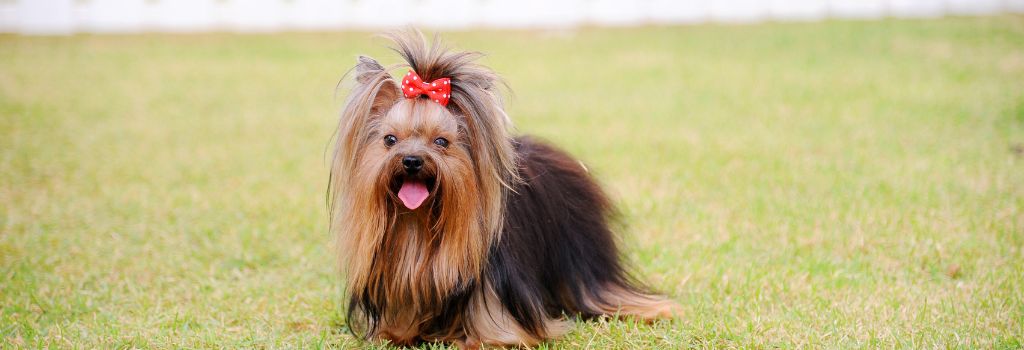
Welcome to the charming world of Yorkshire Terriers, or Yorkies as they're affectionately known. If you've ever met a Yorkie, you know that they pack a lot of personality into a petite frame. Let's dive into what makes this tiny dynamo so captivating.
Tiny but Mighty
Despite their small size, Yorkies are anything but wallflowers. They are brave and ever-ready for an adventure. This pint-sized breed is incredibly alert and always on the go. Their petite stature also means they travel exceptionally well, making them ideal companions for people who love to explore. They're also deeply devoted to their families, boasting a quirky, entertaining personality that adds a sprinkle of joy to every day.
A Protector in a Small Package
Don't let their size fool you; Yorkies are protective of their family and can serve as excellent watchdogs. Their sharp senses and alert disposition make them very effective at alerting you to anything amiss.

Challenges and Quirks
Like all breeds, Yorkies come with their challenges. Housetraining them can sometimes be a more drawn-out process than with other breeds. They can also be cautious or even aggressive towards strangers and other dogs if not adequately socialized. This same protective instinct can also lead to excessive barking if not addressed. If you have young children, be cautious, as Yorkies can be a bit snappy around kids. And, of course, your Yorkie will have a determined streak and a mind of her own.
Why You Wouldn't Want Any Other Breed
Despite these quirks, Yorkies are unquestionably endearing. Their enthusiastic nature and deep love for their families make them treasured companions, not to mention their knack for adventure that makes them fantastic travel buddies.
From Working Roots to Domestic Bliss
Though they're now adored as companion animals, Yorkies have a working-class background. Originally bred to chase rats in the mine shafts and clothing mills of Northern England, these dogs are no strangers to hard work. They arrived in North America in the 1870s and received American Kennel Club (AKC) recognition in 1885. These days, they enjoy a more relaxed lifestyle, primarily as indoor pets. They may not require the strenuous exercise of larger breeds, but a daily walk is essential.
Grooming and Care
Yorkies are not big shedders, but their silky coats do require consistent care, including regular brushing and grooming to keep them looking their best.
In conclusion, a Yorkie is not just a pet but a family member, a protector, and a small bundle of vibrant energy. With the right care and training, you’ll have not just a dog but a loyal friend who will make each day a little more exciting.

Genetic Predispositions for Yorkshire Terriers
Unraveling the Mystery of Cushing’s Disease in Yorkies
A condition that seems to have a special liking for our adorable furballs—Cushings disease, or what the vets call Hyperadrenocorticism. Imagine your Yorkie's adrenal glands getting a little too enthusiastic and pumping out more steroid hormones than needed. Well, that's exactly what happens! The onset can be slow, almost like it's tip-toeing around you, making the initial signs—like drinking a lot more water and seeming a little less active—easy to dismiss. But keep an eye out for a potbelly, hair loss, and thin skin as time passes. If you notice these changes, consult with your vet for diagnosis and a tailored medication plan.
A Close Look at Your Yorkie's Peepers: Watch Out for Eye Issues!
When it comes to the good life, a Yorkie's sparkling eyes are where it all begins! Unfortunately, eye conditions are something of an Achilles' heel for our little ones. From hereditary issues to conditions that can develop over time, your Yorkie's eyes are something you don't want to ignore. Because let's face it: vision problems can seriously cramp their style (and are usually quite painful). Your vet should check those adorable eyes at each visit.
The Cloudy Outlook: Cataracts in Older Yorkies
Time may add wisdom to your Yorkie but can also bring along eye conditions like cataracts. Imagine your pup's once clear eye lenses slowly turning foggy, almost like an unwelcome winter cloud. Older Yorkies often adapt surprisingly well to diminished vision, but for some, surgery could be an option to bring clarity back into their world.
The Dreaded Dry Eye: Don't Ignore Those Itchy Eyes
Dry eye, or what the white coats call Keratoconjunctivitis Sicca (KCS), is more than just a mouthful. It's pretty common among Yorkies and can be a literal pain. Picture their tear glands slacking off, leading to dry, sore eyes. If you notice symptoms like a thick discharge, or your Yorkie trying to paw their eyes, don't play the waiting game. Early treatment usually involves a lifelong commitment to eye ointment, but it will keep those eyes comfy and infection-free!

Liver Problems: When Your Yorkie’s Liver Takes a Detour
In the world of liver disorders, Yorkies are more prone to a particular issue known as Portosystemic Shunt (PSS). Imagine some of the blood that should be filtering through the liver deciding to bypass it instead. This affects the liver’s ability to detoxify the blood, which can lead to stunted growth and even seizures. Regular liver function tests are crucial, especially before any procedure involving anesthesia. The treatment could range from a special diet to surgery, depending on the severity.
The Heart of the Matter: Yorkies and Heart Diseases
Your Yorkie’s tiny heart may be big on love, but it's also susceptible to multiple kinds of heart diseases. These issues can appear early on or sneak in later in life. From murmurs to abnormal rhythms, your vet will use a fine-tooth comb during each check-up to monitor heart health. And if necessary, further tests like X-rays or echocardiograms will be on the cards. Catching these
early can mean medication that makes all the difference, prolonging those love-filled years with your pet.
Nitty-Gritty of Patent Ductus Arteriosis
Yorkies may sometimes come with a minor factory defect—a vessel that should close after birth remains open. This condition, called Patent Ductus Arteriosis, puts undue pressure on the heart. Signs can vary, from fatigue during playtime to coughing and even weight loss. An astute vet can pick this up through a specific heart murmur during regular check-ups. If your pup has this, surgery could be a life-saving measure.
Guarding Against Heart Failure in Your Yorkie's Golden Years
Heart failure is sadly a leading villain when it comes to our Yorkies' senior years. A lot of times, this is due to a weakened heart valve, which can create a condition often referred to as mitral valve disease. If your Yorkie starts showing any outward signs or if a murmur is detected, further tests will help assess how advanced the condition is. The sooner it’s caught, the better the chances medication can help manage it, giving you more precious years with your best friend. And remember, a little dental care and weight management can go a long way in keeping that heart strong!
Bone and Joint Troubles: Keep an Eye on That Yorkie Stride!
You might have noticed that these little furballs sometimes have a peculiar gait—kind of like they're doing a little hop and skip dance. If that’s the case, your pup might have what's known as patellar luxation. Simply put, their kneecap slips out of place occasionally. One moment they're sprinting like a champ, the next, they're doing the moonwalk. Mild cases often only need arthritis medication, but severe ones may require surgery.
Some can develop Legg-Calve-Perthes Disease, a degenerative hip condition that generally shows up when they're 6-9 months old. It’s like growing pains but more serious, often requiring surgical intervention.
A Yorkie’s Spinal Tap: Intervertebral Disc Disease (IVDD)
Yorkies are adorable but they're also susceptible to some not-so-cute spinal issues, like IVDD. Imagine the jelly-like cushion between your pup's vertebrae acting all rebellious and slipping out. Result? Intense pain and possible paralysis. If your doggo suddenly stops climbing stairs, or even refuses to eat, don't wait—call your vet ASAP. Surgery is often the best course for severe cases, while rest and medication may be recommended for less dire situations.
Bladder or Kidney Stones: Don’t Let Your Yorkie Turn into a Rock Collector!
Yorkies have a higher tendency to develop bladder or kidney stones. If you notice blood in their urine or see them straining to go, ring the vet pronto. It’s an emergency!
Sweet But Not Sugarcoated: Diabetes in Yorkies
Yorkies have a slightly above-average risk of developing diabetes, which means daily insulin shots and strict diet control. Look out for symptoms like excessive thirst, increased urination, and weight loss. Early treatment can literally be a lifesaver.
Allergies: More Than Just a Seasonal Sniffle
If your Yorkie spends an abnormal amount of time licking their paws or scratching their belly, they might be dealing with atopy, a skin allergy. Symptoms usually start showing up between 1 and 3 years of age. The silver lining? There are plenty of treatment options!
Delicate Blood Matters: Bleeding Disorders
Yorkies are sometimes born with bleeding disorders like Von Willebrand’s disease. These can be really risky during surgeries, so a blood test is usually advised before any operation.

Teeth Troubles: Don’t Let Puppy Teeth Overstay Their Welcome
In Yorkies, those adorable puppy teeth sometimes forget to fall out. Sounds cute, right? Wrong! It can lead to dental problems later on. Vets often recommend removing these stubborn baby teeth.
When Every Breath Counts: Tracheal Collapse
Imagine your Yorkie's windpipe as a vacuum cleaner hose. Now picture that hose getting flattened. Scary, isn’t it? Mild cases of tracheal collapse usually require medication, while severe ones might need surgical intervention.
Low Blood Sugar: Small but Significant
Hypoglycemia is more common in young Yorkies. Signs like weakness and seizures usually surface after strenuous activity or skipping a meal. Immediate vet intervention is crucial.
Gastro Dangers: Hemorrhagic Gastroenteritis (HGE)
Lastly, let’s talk about HGE, a serious condition characterized by bloody diarrhea and vomiting. Immediate and extensive treatment is absolutely vital; the condition can be fatal if untreated.
If you have questions and you'd like to reach out to us, you can call us directly at (817) 435 4783, or you can email us at [email protected]. Don't forget to follow us on social media Facebook, Instagram.
